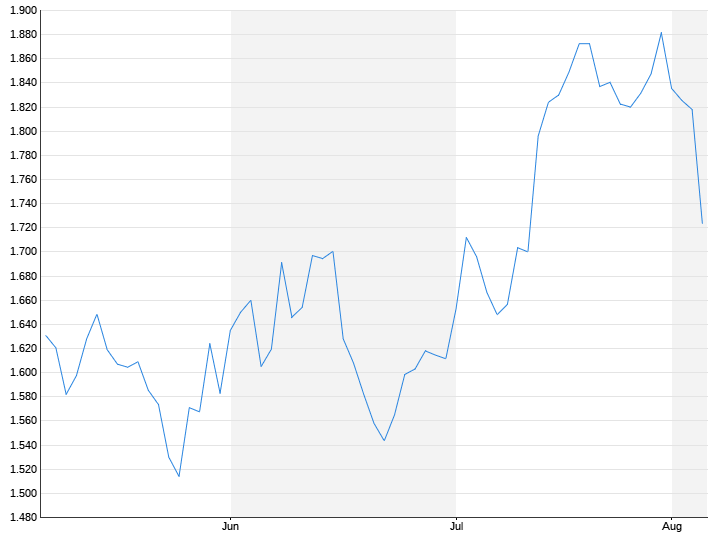No quick recovery in sight
Key sectors dampen hope
8/5/2023 4:24 p.m
The signs point to a downturn. Major companies in key industries such as shipping, advertising and human resources are struggling with high inflation, rising interest costs and more expensive materials. The rating agency Fitch even expects a recession for the world’s largest economy, the USA, at the turn of the year.
Shipping, advertising, human resources: Bad news from important sectors of the economy does not bode well for the economy as a whole. The latest results from the major shipping company Maersk, the recruitment agency Adecco and the world’s largest advertising group WPP indicate that an economic recovery is still a long way off. The sectors represented by the three companies are considered important indicators of the state of the economy. If global shipping traffic falls more than previously expected, labor demand falls and large companies spend less money on advertising, this should dampen hopes of a speedy recovery.
“It’s true, the general economic situation is not the best,” said Adecco boss Denis Machuel. Companies are more reluctant to increase their workforce, and candidates are also wary. “When it’s cold outside, you stay at home.” Adecco is feeling the slowdown in most business areas. The company generated significantly more sales simply by finding new jobs for people who had previously been sorted out by their companies.
World trade is one of the most important indicators for the economy: when things are going well, more goods are transported across the oceans. Industry giant Maersk now expects container traffic to fall by up to four percent – previously there was talk of a maximum of 2.5 percent. The company accounts for about a sixth of global container traffic and carries consumer goods from companies such as Walmart, Nike and Unilever. The high inflation in many countries weighs on purchasing power, many consumers have to save and therefore do without one or the other purchase.
In Germany, for example, the consumer climate barometer is deeply negative. “The level will remain low in the coming months,” says GfK expert Rolf Bürkl. “Private consumption will therefore not be able to make any positive contribution to overall economic development.” This is also indicated by the advertising industry: the global market leader WPP senses a reluctance on the part of US tech companies. That came as a surprise to the company, said WPP boss Mark Read: “Expenditure will increase again over time, but we’re nervous for the rest of the year because we don’t get any clarity on how to proceed.” WPP lowered its growth forecast to 1.5 to 3 percent, from 3 to 5 percent.
China is not a lifeline for the global economy
When money is tight, companies often cut marketing first. In many key regions of the world, there are signs of a downturn amid high inflation, rising interest costs and more expensive materials. The rating agency Fitch expects a recession for the world’s largest economy, the USA, at the turn of the year – and cited this as a reason for withdrawing the coveted top credit rating AAA from the USA.
Things are not looking much better in Europe’s largest economy: Germany has not grown for three quarters in a row. The Ifo business climate index, the most important leading indicator, fell in July for the third month in a row. “I still expect the German economy to contract in the second half of the year,” says Commerzbank chief economist Jörg Kramer.
Even Asia’s largest economy, China, is unlikely to prove to be a lifeline for the global economy. Record youth unemployment, the real estate crisis and enormous debt speak against it. Chinese industry also got off to a bad start in the second half of the year: the purchasing managers’ index fell by 1.3 points to 49.2 points in July. For the first time since April, the barometer is below the 50 mark, from which it signals growth. “Slumping new orders, bleak employment prospects and high inventories point to subdued industrial activity in the coming months,” said Capital Economics analyst Shivaan Tandon.
